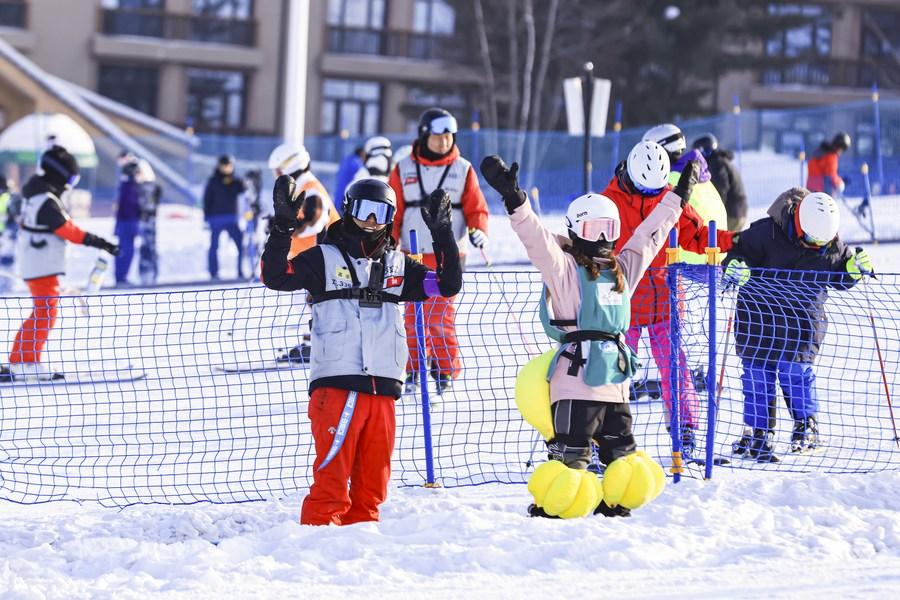
 0 Comment(s)
0 Comment(s) Print
Print E-mail China Daily, November 7, 2024
E-mail China Daily, November 7, 2024
Tourists ski at Changbai Mountain Wanda International Resort in northeast China's Jilin Province, Feb. 11, 2023. [Photo/Xinhua]
More than two years after the Beijing 2022 Winter Olympics concluded, the legacy of the Games lives on, providing a boost to China's winter sports industry with governments, business owners and experts all bullish on the sector's robust growth during the country's next five-year plan period.
With yet another major international event, the 9th Asian Winter Games, set to open in February next year in Harbin, Heilongjiang province, the approaching winter season is expected to witness new highs in the number of ice and snow sports activities, the revenue of related businesses and the number of tourists at skiing destinations, according to officials attending a Wednesday news briefing on winter sports development.
"Since the Beijing 2022 Winter Olympics, the surging public demand for ice and snow sports and related leisure activities has popularized the winter sports sector, while the recent boom only indicates a consistent and even stronger growth in the next five-year development period," said Peng Fuwei, head of the social development department of the National Development and Reform Commission.
The commission, China's economic planning body, will roll out a broad package of policies together with the country's sports governing body and tourism administration, among other departments, to help grow the winter sports sector's total market value to 1.5 trillion yuan ($210 billion) by the end of the 15th Five-Year Plan (2026-30), according to an industry guideline issued by the State Council on Wednesday.
Citing the remaining untapped potential in cold weather sports consumption, the new guideline highlights facility development, winter sports-themed tourism, resort operations and a variety of amateur events among key areas to be further explored.
Better infrastructure support such as more high-speed railway services and domestic and international flights connecting resorts with target markets; streamlined border-entry formalities for overseas professionals, including high-level coaches, trainers and executives in the industry; and more flexible financial policies in loan approval and tax reduction for small businesses are among 24 measures tailor-made in the guideline to address pressing issues hampering winter sports development.
"The guideline kicked in right on time, providing important references for all the government departments, administrators and business owners to develop and implement their own plans accordingly," said Li Jing, a vice-minister of the General Administration of Sport of China.
Driven by major attractions such as the Asian Winter Games in Harbin and a series of World Cup Tour events in speed skating, snowboarding and freestyle skiing, bigger tourist flows are expected at resort clusters and traditional winter holiday destinations across China's northern regions this winter.
Traveling to watch sports events has been a trending holiday choice among China's younger generation, prompting more and more Chinese cities to introduce ice and snow sports events to complement a diverse array of themed tourism packages.
According to the Ministry of Culture and Tourism, Harbin welcomed over 87 million tourists during the 2023-24 winter season, up 300 percent year-on-year, and saw a total revenue of 124.8 billion yuan. Both figures are expected to increase during the hosting of the Asian Winter Games from Feb 7 to 14.
Thanks to a long industrial chain, from equipment manufacturing to skills training and sporting goods sales, the ice and snow sports tourism market boasts strong growth potential, according to Zhang Li, executive vice-president of Asia Data Group, a consultancy and promoter of winter sports.
"The growing demand for ice and snow activities taps into a wide variety of business subdivisions, including tourism, education, fitness, accommodation and training," Zhang said during last month's World Winter Sports (Beijing) Expo. "The development speed of China's ice and snow industry has entered a more stable and sustainable stage, with a lot more growth ahead."
China's technological progress is also pushing winter sports to break seasonal and geographic boundaries, with new solutions such as artificial dry-snow slopes and virtual reality skiing simulators diversifying business offerings at both indoor and outdoor venues, added Hao Lishun, an official with the Ministry of Industry and Information Technology.
Go to Forum >>0 Comment(s)